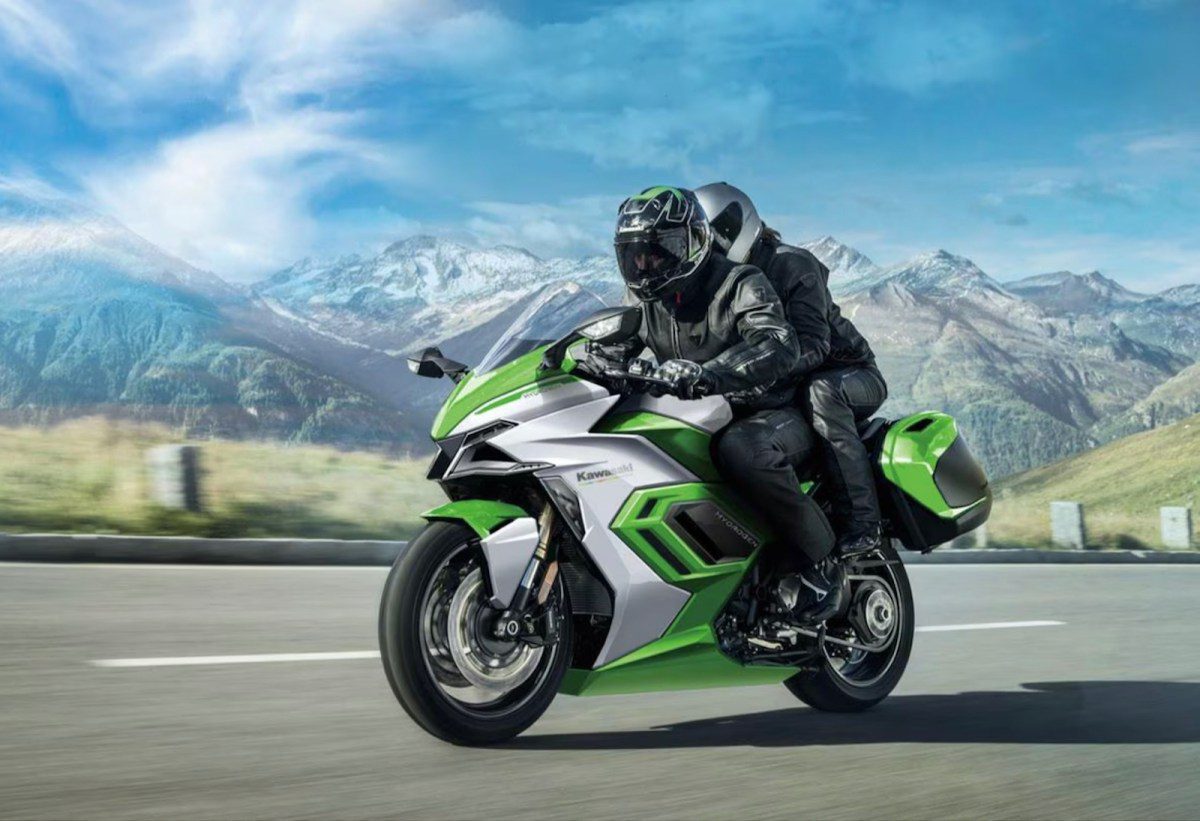Global Courant 2023-05-20 07:29:07
Japanese motorcycle manufacturers Kawasaki, Suzuki, Honda and Yamaha are teaming up to develop hydrogen-powered internal combustion engines for ‘small mobility’. In addition to motorcycles, these are likely to include various hydrogen-powered mini-vehicles, small seagoing vessels, construction equipment and drones.
Each company develops its own end products. Their current product lines give an indication of what that could be in addition to those mentioned above: three- and four-wheel minicars, all-terrain and all-terrain vehicles, snowmobiles, jet skis, outboard motors for small boats, golf carts, and multi-purpose engines for lawnmowers and generators, for example.
The four companies announced this week that they have received approval from Japan’s Ministry of Economy, Trade and Industry (METI) to form a research association for “Hydrogen Small mobility & Engine technology” (HySE) with Kawasaki Heavy Industries (KHI) and Toyota Motor. ) to establish. supporting members.
The association’s R&D efforts will focus on the functionality, performance and reliability of hydrogen-powered engines and the fuel system, including small hydrogen tanks and related equipment.
Japanese idea of green
The companies participating in HySE, other Japanese auto companies and the Japanese government favor “a multi-path strategy” to move beyond gasoline engines and achieve zero-emission transportation.
They have been relatively slow to embrace battery-powered electric vehicles (EVs), favoring hybrids and continuing to develop alternatives, including hydrogen fuel cells and now hydrogen combustion engines. For this they have been harshly criticized by Greenpeace and other decarbonisation purists.
In response, Toyota’s chief scientist, Gill Pratt, explains that when it comes to carbon neutrality (the term for having a balance between emitting carbon and absorbing carbon from the atmosphere into carbon sinks), “diversity is strength.”
Pratt has been CEO of Toyota Research Institute (TRI) since 2016. Before that, he worked for several years at the US Defense Advanced Research Projects Agency (DARPA), where he led the research programs Robotics Challenge, Robotics Research and Neuromorphic Computing. He says,
Making a BEV (battery electric vehicle) requires up to six times more critical minerals than a conventional gasoline-powered vehicle. In addition, a battery factory can be built in two to three years, while a new mine takes 10 to 15 years to be operational. As a result, despite the abundance of untapped battery minerals on the planet, many experts, including the IEA (International Energy Agency), predict a 30-50% shortage in battery minerals over the next 10-20 years (roughly the life of a car) .
Partly because of this, there is room for hybrids and other alternatives, including hydrogen combustion engines. When hydrogen is used as a fuel, the only emission is water. There is no potential shortage of lithium or the need to recycle batteries.
But whether HySE’s small hydrogen combustion engines will become a commercial success is another question.
A hydrogen motorcycle engine. Image: RideApart
Japan’s hydrogen refueling infrastructure is gradually expanding, with around 170 stations built so far and METI targeting 900 by 2030. But as demand for hydrogen-powered vehicles picks up, stations are likely to be added more quickly. ENEOS, Japan’s largest automotive fuel distributor, operates approximately 13,000 roadside filling stations nationwide.
Earlier this month, the MK taxi company opened a dedicated hydrogen refueling station for its own vehicles in Kobe. It was the first of its kind and was converted from liquefied petroleum gas (LPG) by Air Liquide. The French industrial gas company plans to build more hydrogen refueling stations for taxis, buses and long-distance trucks across Japan in the coming years.
The Cummins Precedent
The small mobility applications that HySE is considering are new, but the concept is not. US engine manufacturer Cummins announced its research into hydrogen internal combustion technology in July 2021, aiming to develop carbon-free power sources for heavy trucks, excavators, wheel loaders, drilling rigs and industrial equipment.
At the CONEXPO trade show for the construction industry in March 2023, Cummins presented its new fuel-independent 15-liter internal combustion engine platform that can be used with hydrogen, natural gas and diesel. The company has reportedly already received hundreds of orders for its hydrogen version from the trucking industry.
According to Cummins, hydrogen internal combustion engines are “an ideal low-cost carbon-free solution for high load factor, high utilization applications” because “there are applications where battery electric solutions cannot meet operational requirements and fuel cells are not yet economically viable. ”
A hydrogen-powered engine “fits into today’s trucks, works with today’s transmissions, and integrates seamlessly into the industry’s existing service networks and practices.”
Jim Nebergall, Cummins General Manager for Hydrogen Engines, says, “These engines look like engines, they sound like engines, and they fit where engines normally fit.” They are the easiest way for a trucking company or other organization to introduce zero-carbon engine technology.
For those who want to know more about it how hydrogen engines workCummins has posted a tutorial on its website.
By the way, compared to the heavy 15-liter engine from Cummins, the Suzuki Swift hybrid minicar has a 1.2-liter gasoline engine. Yamaha Motor’s WaveRunner jet ski has a 1049 cc (1,049 liter) engine.
Headquarters in Tokyo
Within HySE, KHI will contribute its experience as one of the participants in Japan’s CO2-free “Hydrogen Energy Supply-chain Technology Research Association” (HySTRA). Toyota will contribute knowledge of its work on hydrogen-powered power units for four-wheel vehicles.
HySE will be headquartered in Tokyo, with Kenji Komatsu, executive officer of Yamaha Motor’s Technical Research & Development Center, as chairman.
Komatsu stated, “We are committed to this endeavor with a sense of mission to preserve the use of internal combustion engines, which embody the long-term efforts invested by our predecessors.”
Follow this writer on Twitter: @ScottFo83517667
Similar:
Loading…








